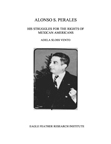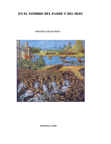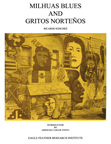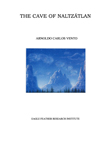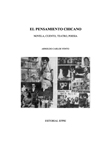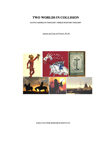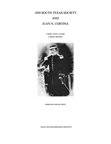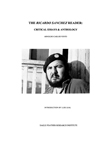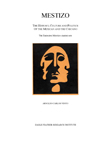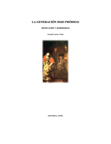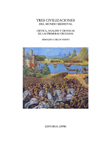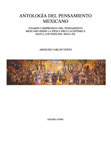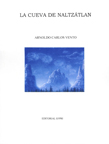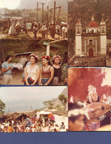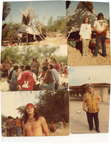  |
|||||
|
INTERNET DISCOUNT: 33% OFF Please email Arnold for more information: acvento@eaglefeather.org BOOKS IN PRINT
E-BOOKS (CD FORMAT)
ARTICLES Vento, Arnoldo Carlos. “Rediscovering the Sacred: From the Secular to a Post-Modern Sense of the Sacred.” (19pp) Examines Christianity as seen in the U.S. and contrasts religious views of Native Americans both from U.S. and Mexico. First appeared in special Native American journal and anthology of Wicazo Sa Review. Vento, Arnoldo Carlos. “Aztec Myth and Cosmology: Historical-Religious Misinterpretation and Bias.” (36pp.) Examines the major colonial myths invented by the Spanish on Aztec civilization. Shows how the Spanish projected their own medieval European world in characterizing a culture alien to theirs. Shows how the word America has nothing to do with Albericus Vespucci. First appeared in Wicazo Sa Review. Vento, Arnoldo Carlos. “Pre-Columbian Cultures of Mexico”. (41pp) First chapter of Mestizo: The History, Culture and Politics of the Mexican and Chicano. Covers the Classical Period: The Rise of Great Civilizations, the Post Classic Period: The Toltekah Confederation and the Post Classic Renaissance: The Confederation of Anauak. Concludes with twenty two scientific and cultural advances that set the Aztecs apart from the rest of the world. Geerk, Frank. “A Red Man in the White House?” First English translation of article that appeared in an anthology entitled Poesie Zeitzschrift fur Literature and an article in Basler Magazin (Germany). Covers the background to the gathering of Native Nations at the Fort McDowell Reservation in Arizona. Has insights from Mad Bear, Crow Dog, Tigre Perez and others regarding the state and future of Native Americans. Vento, Arnoldo Carlos. “Native American Evolution and Cultural Worldview”. (40pp) Examines Western cultural worldview and contrasts with Native American culture; the imposition and hegemony in the Americas; cultural, historical and religious distortion in Spanish America, conflict with materialism and U.S. society and provides an autochthonous philosophical and ideological paradigm of Native American society.
Vento, Arnoldo Carlos. “Itzcuintli o Techichi: ¿Perro o pieza de resistencia culinaria?” (7pp) Insightful article showing the blunders of Spaniards regarding the naming of animal and fauna in the Americas. Of particular interest is the fallacious assumption of eating dogs by the Aztecs. Vento, Arnoldo Carlos. “Ricardo Sánchez: Ars Poetica.” (19pp) Critical article from The Ricardo Sánchez Reader: Critical Essays and Anthology. Examines the poetry of the father of Chicano poetry, from his early beginnings of the Pinta Period to the last, the Nascent Period. Shows his contribution to poetry and his place in literature. Canales, J.T. “Juan N. Cortina: Bandit or Patriot?” (25pp) Reprint of attorney J.T. Canales’ address to the Rio Grande Historical Society and defense of Cortina.(1951) Dismisses the label of bandit as found in textbooks today. A rare pamphlet today.
Vento, Arnoldo Carlos. “Aztec Conchero Danza Traditon: Historic, Religious and Cultural Significance.” (14 pp). Reprint. First appeared in Wicazo Sa Review. Analysis of the Conchero Danza, a tradition that begins circa 1537 in Mexico. Shows breakdown of instruments, steps, order and symbolism. Points to its hybrid nature and accommodation but also to its hidden retention of authentic Aztec tradition. Credits Maestro Andrés Segura for proliferation of troupes in the U.S. Insights provided by José Flores Peregrino, Capitán of the Austin Conchero Danza troupe. Vento, Arnoldo Carlos. “Visión de las Culturas Pre-Colombinas a Través de las Fuentes de Pos-Conquista”. (19pp). Problems of early native/mestizo historians regarding interpretations and authenticity of sources. Spanish religious and cultural barriers. Edict to preserve worldview. Errors by modern researchers. El Midwest Canto al Pueblo C/S. (17pp) First and original national media coverage on historic Art and Literature festival held in Milwaukee in 1977. Excellent information on origins, objectives and performances. Early photos of art and of Chicanos/as Lorna Dee Cervantes, Mario Acevedo, Alurista and Arnold Vento notwithstanding Native Americans Barney Bush and Santee Dakota John Trudell. Vento, Arnoldo Carlos. “Estudio Etimológico: Una perspectiva socio-lingüística e histórica del habla Chicano.” (11pp) Early work that probes into the unique argot and expression of the Chicano. Shows etymological origins of words and classifies it into four distinct languages. Also shows historical factors that are responsable for the use of certain words. Vento, Arnoldo Carlos. “Imágenes y Esencia del Mexicano: Mestizaje y Mexicanidad (42 pp) Detailed study into mexicanidad, the essence of being Mexican. Historical, cultural and literary analysis. Origins, early voices of protest and Spanish racism from the Visigoths to the Conquistadores. Reviews contemporary studies on mexicanidad; includes Caso, Ramos, Vasconcelos, Zea, Paz and Iturriaga. Vento, Arnoldo Carlos. “Significado de Aztlan: De la pre-historia al presente”. (5pp) Short creative and historical essay on the origins of the “mythical” Aztlan. Focuses on three ways one can use the concept of Aztlan. Vento, Arnoldo Carlos. “El Periquillo y el Quijote”. Literary analysis. First appeared in Revista Universidad de Mexico in 1965. A comparative study between the first classic work in Spain and the first novel in Spanish America. Although censored, shows influence of the Quijote on El Periquillo Sarniento of Lizardi. Vento, Arnoldo Carlos. “Chicano Studies: From the Seventies to the Twenty First Century”. (13pp) Good review and analysis of questions regarding the formulation of Chicano Studies; Academic and political problems from administrators to faculty. Shows current institutional problems of society. Need for historical and cultural honesty and integrity. Vento, Arnoldo Carlos. “Mito y Símbolo Pre-Hispánico en la Literatura Mexicana y Chicana”. Paper presented at the MLA convention in 1979. Analysis of Anaya’s Bless Me Ultima from the perspective of pre-Columbian symbol and meaning. Early work of author regarding Aztec society. Shows tie of curandera Ultima to Indigenous past particularly as it concerns healing, a tradition with cultural and cosmological significance. Need for rectification of false mythic perceptions of the Native past. Vento, Arnoldo Carlos. “Contemporary Chicana Poetry: 1969-1977”. (42pp) Written in the seventies. Reveals the early works and concerns of Chicana poets. Featured are Josie Mora (Alivia Nada), Emilia López, Margarita Cota Cárdenas, Miriam Bornstein Somoza and Raquel Elizondo. Vento, Arnoldo Carlos. “Mas Allá de lo Fantástico: El realismo mágico, su definición y realidad en la literatura mexicana”. (12pp) Paper presented in Havana, Cuba. Background and origin of Magical Realism in art and literature. Examines artists Rousseau, Giorgio de Chirico and exemplary Magic Realist authors María Luisa Bombal, Agustín Yáñez, Elena Garro and Juan José Arreola. Reveals Magic Realism existed before post-expressionistic european art movement. Vento, Arnoldo Carlos. “Sangre y Amor: Tradición y libertad en Redil de Ovejas”. (17pp) In Vicente Leñero’s novel, there is the medieval legacy present in modern day Mexico City. Author probes into the conscience of the clergy (as did Yáñez in Al filo del Agua) in all of its hypocrisy, frustration and guilt between the Church and it parishoners. Vento, Arnoldo Carlos. “Origin and Significance of Canto al Pueblo: Image, Symbol and Identity of an Aesthetic Movement”. (14pp) Reviews historic gathering of artists and writers in the first Canto al Pueblo in Milwaukee, Wisconsin (1977). Shows tie and distinction between Flor y Canto and Canto al Pueblo, problems of Chicanos, goals and development. Written by one of the founders of Canto al Pueblo. Vento, Arnoldo Carlos. “Mitos, corrupciones históricas y la problemática de la fuentes de pos-conquista”. (19pp) Discusses problems faced by early native/mestizo historians regarding interpretation and authenticity. Spanish political, religious and cultural barriers. Cuautemoctzin edic in Aztec náhuatl for the preservation of Aztec worldview. Errors by XX century researchers in interpreting the Huehuetlatolli, a post-Conquest document gathered from colonial natives under the supervision of the Inquisition. |
|||||

